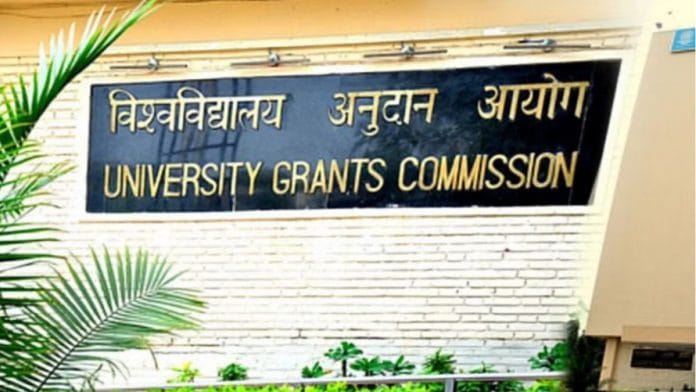New Delhi: The University Grants Commission (UGC) has released revised draft guidelines to promote equity in higher education, including mandatory undertakings from students and faculty, Equal Opportunity Centres, representation of women and SC/ST communities in equity committees, and a faster procedure in cases of discrimination, among others. The guidelines also call for stricter penalties for non-compliance, and even de-recognition in some cases.
The draft of the UGC (Promotion of Equity in Higher Education Institutions) Regulations, 2025 released following the Supreme Court’s directive on 3 January, aims to address caste-based discrimination and suicides in higher education. This follows a 2019 petition by the mothers of Rohith Vemula and Payal Tadvi, who died by suicide in 2016 due to alleged discrimination on their campuses.
Once approved, these guidelines will replace the UGC (Promotion of Equity in Higher Educational Institutions) Regulations, 2012.
The UGC has sought suggestions from stakeholders within the next 30 days.
Also Read: Delhi student politics is changing. New DUSU president’s use of fear and force has many fans
Equal Opportunity Centre with women & SC/ST representatives
The draft UGC regulations mandate that every higher education institution establish an Equal Opportunity Centre to oversee policies and programmes for disadvantaged groups. The centre will offer guidance and counselling on academic, financial, and social matters while promoting diversity on campus.
The centre will collaborate with civil society, local media, police, district administration, NGOs, faculty, staff, and parents to achieve the regulations’ objectives. The head of the institution will appoint a permanent professor with a strong interest in the welfare of disadvantaged groups to serve as the centre’s coordinator.
An equity committee, appointed by the head of the institution, will manage the centre’s operations and address complaints of discrimination. The committee will comprise the head of the institution as the ex-officio chairperson, four senior faculty members, two civil society representatives, two student representatives (selected based on merit or achievements), and the coordinator of the centre as the member secretary.
The committee must include at least one woman and one member each from the SC and ST categories.
Undertaking from students to avoid discrimination
To promote equity, the draft norms propose that higher education institutes (HEIs) must ensure all students, faculty, and staff submit an undertaking at admission or renewal, committing to promoting equity and avoiding discrimination. The regulations and details of the equity helpline must be prominently displayed on the institution’s website for easy access.
Each academic session, the head of the institution must convene a meeting with key stakeholders—such as hostel wardens, students, parents, faculty, staff, and local authorities—during orientation to discuss equity and raise awareness. A video of this meeting should be available on the HEI’s website. Additionally, posters promoting equity must be displayed around the campus to reinforce awareness.
HEIs should also engage professional counsellors to support students, faculty, and staff on equity-related matters. Institutions must implement UGC guidelines that promote equitable opportunities, especially for socio-economically disadvantaged groups (SEDGs).
HEIs should encourage the reporting of discrimination incidents while ensuring confidentiality for those who wish to remain anonymous, the draft guidelines stated.
Equity Squad, Equity Ambassador, and a helpline
According to the guidelines, every HEI will form “Equity Squads”, smaller bodies tasked with monitoring and preventing discrimination on campus. These squads, which may be established in necessary numbers, will be mobile and frequently visit vulnerable areas. They will report their findings to the coordinator of the Equal Opportunity Centre.
Additionally, each unit, department, faculty, school, hostel, library, or facility within the HEI will designate at least one stakeholder as an “Equity Ambassador”.
“These ambassadors will champion equity on campus, maintain regular contact with the Coordinator, and serve as the point of contact for implementing programmes or activities from the Equal Opportunity Centre. They will also report any equity violations promptly,” the guidelines stated.
The UGC draft guidelines mandate that every HEI establish a 24/7 “Equity Helpline” to support stakeholders facing discrimination. The helpline will ensure confidentiality for those reporting violations, should the informant request it.
Faster procedure for addressing discrimination incidents
According to the draft guidelines, in the event of a discrimination incident, the aggrieved person can report it via an online portal or the equity helpline. If the helpline receives a report suggesting a potential violation of penal laws, the case will be forwarded to the relevant police authorities.
The equity committee will convene within 24 hours of receiving the report to take appropriate action. A detailed report will be submitted to the head of the institution within 15 working days, with a copy sent to the aggrieved person. Based on the report, the head of the institution will take further action as per institutional rules. If the case involves penal laws, the police will be informed.
If the complaint is against the head of the institution, the coordinator of the equal opportunity centre will chair the meeting, and the report will be forwarded to the next higher authority.
The guidelines also state that anyone found making a false discrimination complaint will be fined by the equity committee.
The UGC will establish a monitoring mechanism to assess the progress of these regulations. This may involve collecting information from HEIs and conducting campus visits. Based on the review, the UGC may advise HEIs on necessary actions to meet the regulations’ objectives.
The guidelines further state that if an HEI fails to comply with these regulations, the UGC will form an inquiry committee to investigate.
If non-compliance is confirmed, the HEI may face penalties, including being debarred from UGC schemes, offering degree programmes, or providing open and distance learning (ODL) and online courses. The institution may also be removed from the UGC’s list of recognised HEIs, with punitive actions determined on a case-by-case basis.
(Edited by Radifah Kabir)
Also Read: DU proposes new courses on Bhagavad Gita, ‘Viksit Bharat’ for UG students amid objections by faculty






